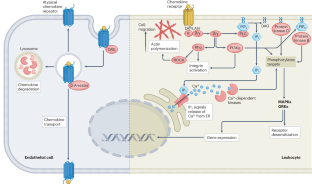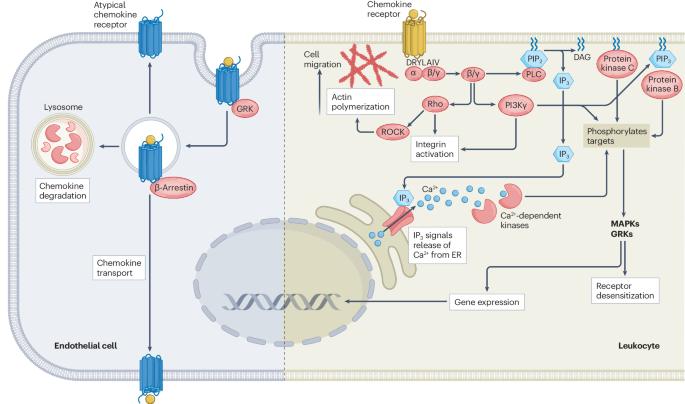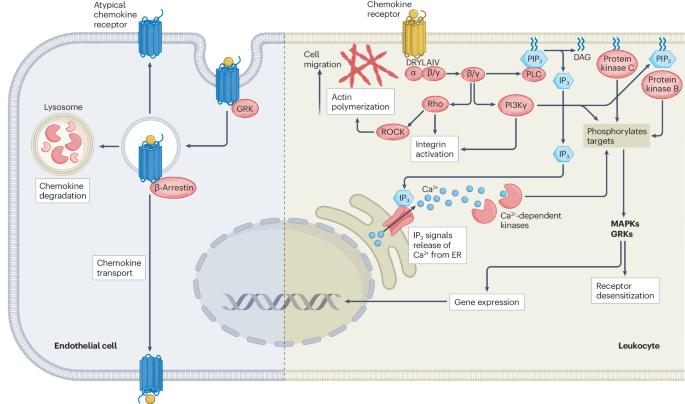免疫系统中的非典型趋化因子受体
IF 67.7
1区 医学
Q1 IMMUNOLOGY
引用次数: 0
摘要
白细胞迁移是先天性和适应性免疫反应的基本组成部分,因为它控制着这些运动细胞的招募和定位,这对免疫细胞的启动、效应功能、记忆反应和免疫调节至关重要。这种复杂的细胞运输系统在很大程度上是通过高度调节分泌型趋化因子的产生及其膜系 G 蛋白偶联受体的限制性表达来控制的。趋化因子及其受体的活性还受一个被称为非典型趋化因子受体(ACKRs)的分子亚家族的调控,ACKRs 是类似于趋化因子受体的分子,不与经典的信号通路耦合,这些信号通路在趋化因子的作用下促进细胞迁移。在过去十年中,人们在了解这些受体的生物学特性及其在免疫系统中的功能方面取得了很大进展。在这里,我们描述了各种 ACKR 对先天性和适应性免疫反应的贡献,并特别关注最近的进展。这包括最近确定 ACKR 在形成细胞外趋化因子梯度中的作用的研究结果、扩大这些受体识别的趋化因子配体范围的研究结果、ACKR 家族的候选新成员,以及我们对这些受体在形成先天性和适应性免疫细胞迁移中的作用的进一步了解。本文章由计算机程序翻译,如有差异,请以英文原文为准。



Atypical chemokine receptors in the immune system
Leukocyte migration is a fundamental component of innate and adaptive immune responses as it governs the recruitment and localization of these motile cells, which is crucial for immune cell priming, effector functions, memory responses and immune regulation. This complex cellular trafficking system is controlled to a large extent via highly regulated production of secreted chemokines and the restricted expression of their membrane-tethered G-protein-coupled receptors. The activity of chemokines and their receptors is also regulated by a subfamily of molecules known as atypical chemokine receptors (ACKRs), which are chemokine receptor-like molecules that do not couple to the classical signalling pathways that promote cell migration in response to chemokine ligation. There has been a great deal of progress in understanding the biology of these receptors and their functions in the immune system in the past decade. Here, we describe the contribution of the various ACKRs to innate and adaptive immune responses, focussing specifically on recent progress. This includes recent findings that have defined the role for ACKRs in sculpting extracellular chemokine gradients, findings that broaden the spectrum of chemokine ligands recognized by these receptors, candidate new additions to ACKR family, and our increasing understanding of the role of these receptors in shaping the migration of innate and adaptive immune cells. This Review from Comerford and McColl discusses recent advances that have been made in understanding the biology of the atypical chemokine receptor (ACKR) family. The authors explain how these receptors interact with their ligands to shape immune responses and also highlight potential new additions to the ACKR family.
求助全文
通过发布文献求助,成功后即可免费获取论文全文。
去求助
来源期刊

Nature Reviews Immunology
医学-免疫学
CiteScore
93.40
自引率
0.40%
发文量
131
审稿时长
6-12 weeks
期刊介绍:
Nature Reviews Immunology is a journal that provides comprehensive coverage of all areas of immunology, including fundamental mechanisms and applied aspects. It has two international standard serial numbers (ISSN): 1474-1733 for print and 1474-1741 for online. In addition to review articles, the journal also features recent developments and new primary papers in the field, as well as reflections on influential people, papers, and events in the development of immunology. The subjects covered by Nature Reviews Immunology include allergy and asthma, autoimmunity, antigen processing and presentation, apoptosis and cell death, chemokines and chemokine receptors, cytokines and cytokine receptors, development and function of cells of the immune system, haematopoiesis, infection and immunity, immunotherapy, innate immunity, mucosal immunology and the microbiota, regulation of the immune response, signalling in the immune system, transplantation, tumour immunology and immunotherapy, and vaccine development.
 求助内容:
求助内容: 应助结果提醒方式:
应助结果提醒方式:


